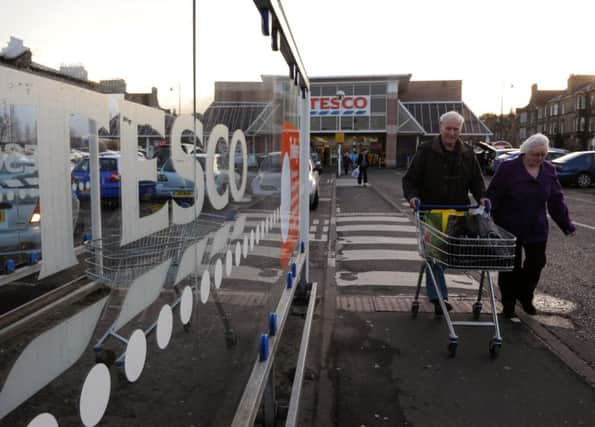Tesco chief faces City grilling


Britain’s biggest retailer is due to provide an update on its probe into a £250 million accounting blunder when it delivers interim results on Thursday.
The publication of the figures was put back by three weeks after the chain admitted last month it had overstated its expectations of earnings for the period. That triggered the third profits warning in as many months for Tesco, as well as a fresh headache for new chief executive Lewis just weeks after he took over from predecessor Philip Clarke.
Advertisement
Hide AdAdvertisement
Hide AdShares have fallen by nearly a third since the end of August and are worth half as much as a year ago.
Lewis was drafted in from Unilever after Tesco’s worst trading performance in four decades – a first-quarter like-for-like sales fall of 3.7 per cent – sparked Clarke’s departure.
Latest industry data from Kantar Worldpanel has indicated further gloom, with total sales falling 4.5 per cent in the 12 weeks to 14 September and market share, which last year was more than 30 per cent, shrinking to 28.8 per cent.
The group is caught up in a supermarket price war as the major grocers battle the threat from discounters Aldi and Lidl.
Brewin Dolphin analyst Nicla Di Palma said the two German discounters had now reached “the critical mass necessary to compete effectively against the major supermarkets” and could “clearly afford to compete for the long term”.
“We believe Tesco’s strategy cannot be based exclusively on price cuts,” said Di Palma. “This would probably drive customers back in store in the short term and might eventually lead to the exit from the market of a few marginal players.
“However, this strategy would not be sustainable in the long term. What we believe it more likely is that Tesco will instead decide to invest in its stores and products following a ‘Sainsbury-like’ model.”
Tesco has now admitted that issues uncovered in its UK food business would mean that its previous prediction of half-year trading profits in the region of £1.1 billion looked likely to have been overstated by £250m.
Advertisement
Hide AdAdvertisement
Hide AdThe warning suggests a figure of around £850m, representing a 46 per cent fall on the £1.59bn profit haul recorded for the same period last year.
It has ordered a review into the error to be carried out by Deloitte together with legal heavweight Freshfields. The inquiry is looking into the way the company treated rebates paid by suppliers and whether they were reported in the right time period. The Financial Conduct Authority is also investigating. Tesco has so far asked eight executives, including UK managing director Chris Bush, to step aside.
Shore Capital analyst Clive Black said the group had suffered a “catalogue of disasters” and “faces considerable challenges”.
Lewis has endured a bumpy ride since starting as chief executive on 1 September, a month earlier than planned and just days after Tesco announced it was cutting its dividend by 75 per cent and slashing spending on store refits by £400m a year.
Chairman Sir Richard Broadbent said the move would shore up the firm’s financial position and give it “strategic optionality”. Cantor Fitzgerald analysts said it could give Tesco a £1.3bn war-chest to face down rivals in the price war.